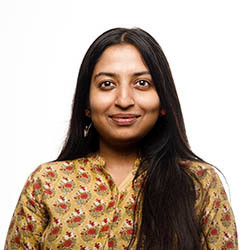Award-winning Indian chefs partner with UN agency IFAD to create Recipes for Change
IFAD Asset Request Portlet
Publicador de contenidos
Award-winning Indian chefs partner with UN agency IFAD to create Recipes for Change
17 junio 2022Rome, 17 June 2022 – Award-winning Indian chefs Anahita Dhondy and Thomas Zacharias have joined the UN’s International Fund for Agricultural Development (IFAD) to promote Recipes for Change (R4C), a platform that aims to bring a taste of rural people’s lives to consumers through the food they eat.
Linking farmers to consumers, R4C celebrity chefs show how the climate crisis affects rural communities – as well as how IFAD’s support helps them to not just survive but also thrive as we foster a more sustainable future for food systems.
“Recipes for Change calls attention to the devastating impact of climate change on rural people’s livelihoods, as those who grow our food – and their families - are most likely to go hungry,” said Ulaç Demirag, IFAD Country Director, India. “Working with innovative, thoughtful chefs like Anahita and Thomas, we hope to tackle barriers to socially and environmentally friendly food systems in a way that helps consumers learn about these issues and how they could lead change though their choices.”
Through Recipes for Change, IFAD encourages consumers to buy more sustainably, chefs to cook smarter, and donors to commit to the eradication of rural poverty. Anahita Dhondy, former chef manager at SodaBottleOpenerWala and author of The Parsi Kitchen, said, “I’ve always aligned my work very closely with the Sustainable Development Goals and I’ve always been questioning how we as chefs can do our part in eradicating hunger. Creating awareness is the most important thing, and that’s why I think joining IFAD’s Recipes for Change can create that important, positive social impact.”
Thomas Zacharias, named chef of the year in 2018 by Conde Nast Traveller India while at The Bombay Canteen, said, “The synergy of a collective movement towards making shifts towards understanding what happens in our rural agricultural areas and in the context of people growing our food can fuel positive change, which we so desperately need today. And what better medium than food and recipes, something that is so universal yet so personal?” Zacharias recently launched The Locavore, a platform focused on ‘doing good through food’, which aims to narrow the divide between the people behind our food and consumers via storytelling, producer spotlights, events and experiences.
Recipes for Change was launched in 2015 ahead of the 21st Conference of the Parties to the UN Framework Convention on Climate Change in Paris. It is designed to be an engaging way to highlight the importance of small-scale farmers in our food systems, as well as the practical ways in which IFAD and its partners are already working with farmers in developing countries to adapt to the climate crisis. So far, we have recipes from more than 20 countries around the world, including one from India, as well as from Sri Lanka, Nepal and Bhutan. Some chefs on our roster include Michelin-starred Carlo Cracco, Pierre Thiam, Bela Gil and Ali Artiste, all of whom are committed to sustainably produced food in their cooking.
India is a founding member of IFAD, and IFAD has worked in India for more than 40 years. The current country strategic opportunities programme is fully aligned with the government’s policy framework and efforts to ensure that smallholder food and agricultural production systems are remunerative, sustainable and resilient to climate change and price shocks. To date, IFAD has supported 32 rural development projects in India worth US$1.2 billion. These interventions have directly benefitted over 6.34 million families.
Read more about IFAD’s work in India.
Follow us on Twitter: @IFADSouthAsia
Press release No.: IFAD/38/2022
IFAD is an international financial institution and a United Nations specialized agency. Based in Rome – the United Nations food and agriculture hub – IFAD invests in rural people, empowering them to reduce poverty, increase food security, improve nutrition and strengthen resilience. Since 1978, we have provided more than US$23.2 billion in grants and low-interest loans to fund projects in developing countries. Last year, IFAD-supported projects reached an estimated 130 million people.
A wide range of photographs of IFAD’s work in rural communities are available for download from its Image Bank.
